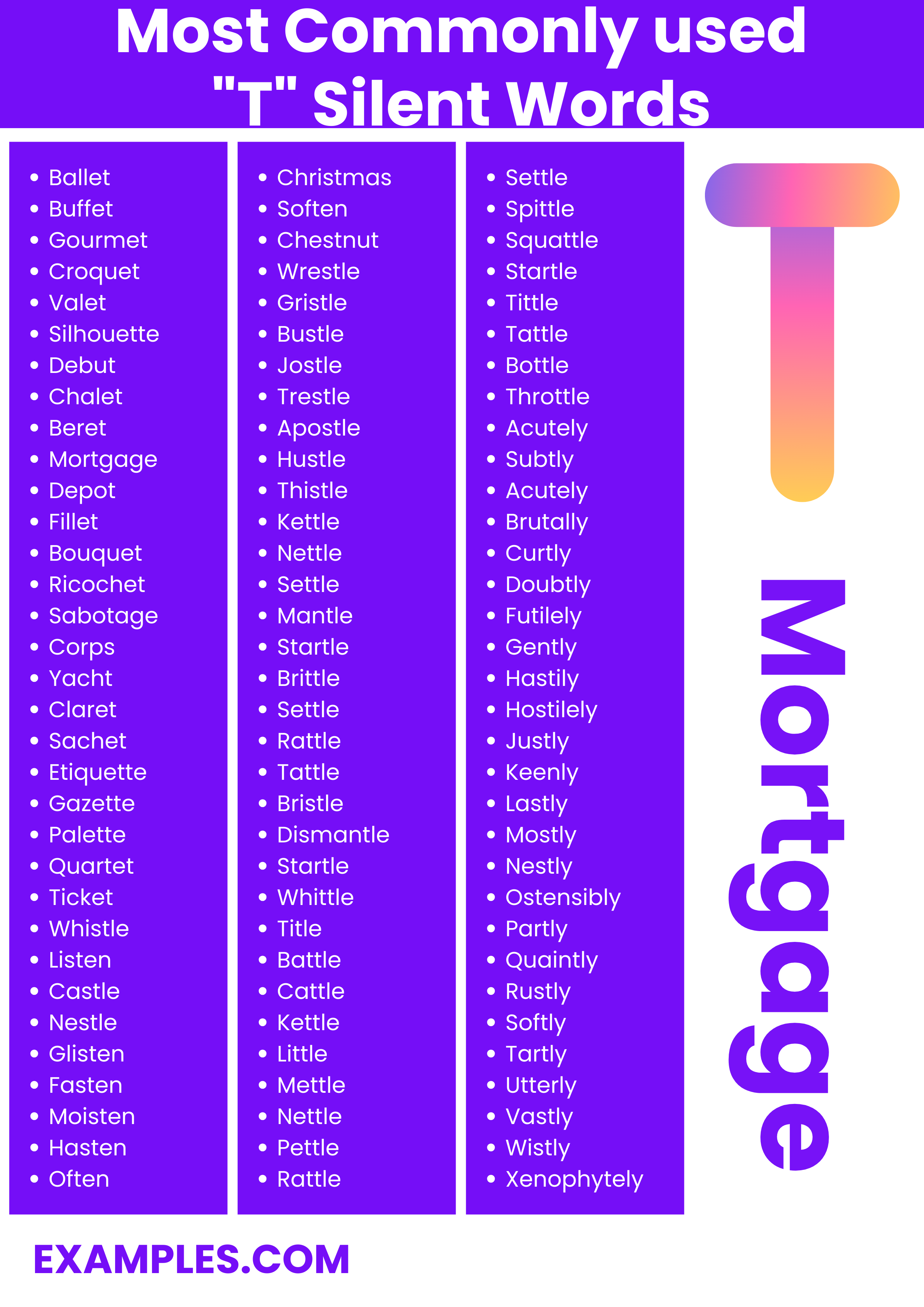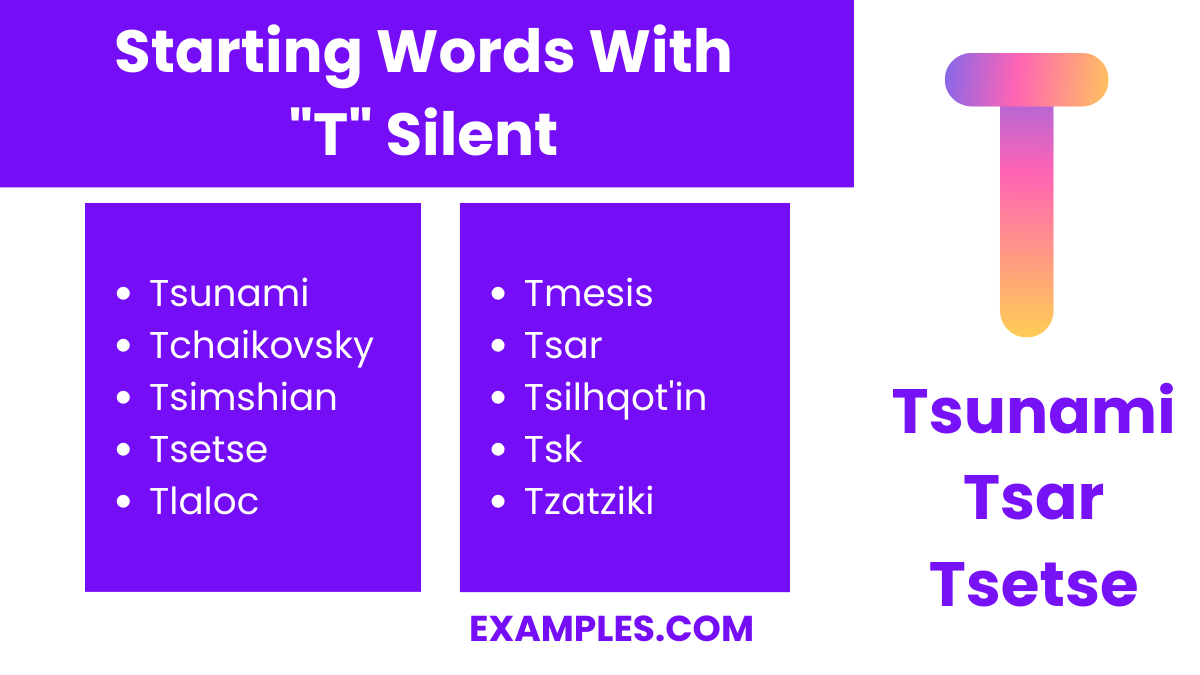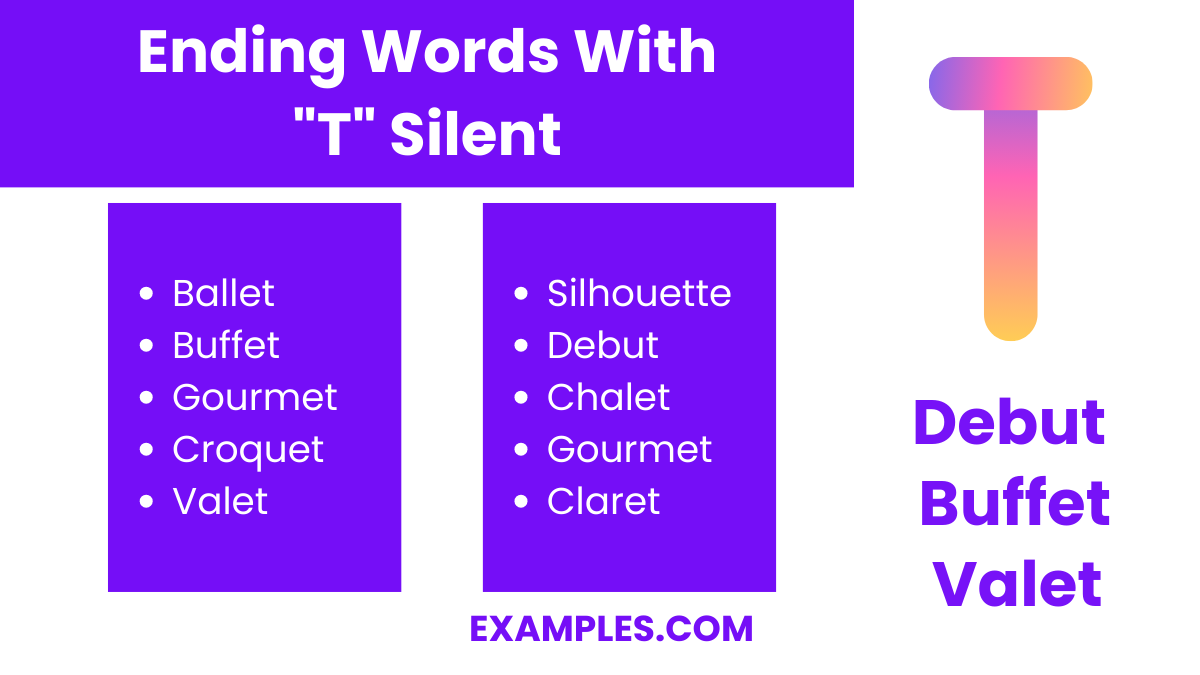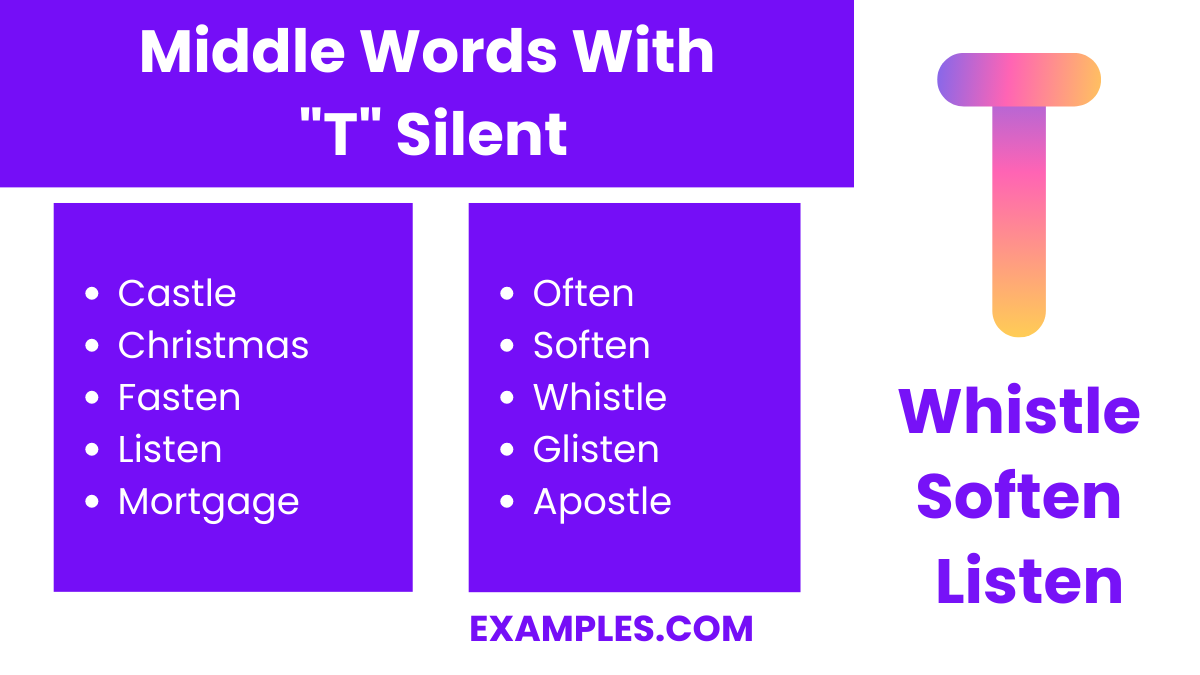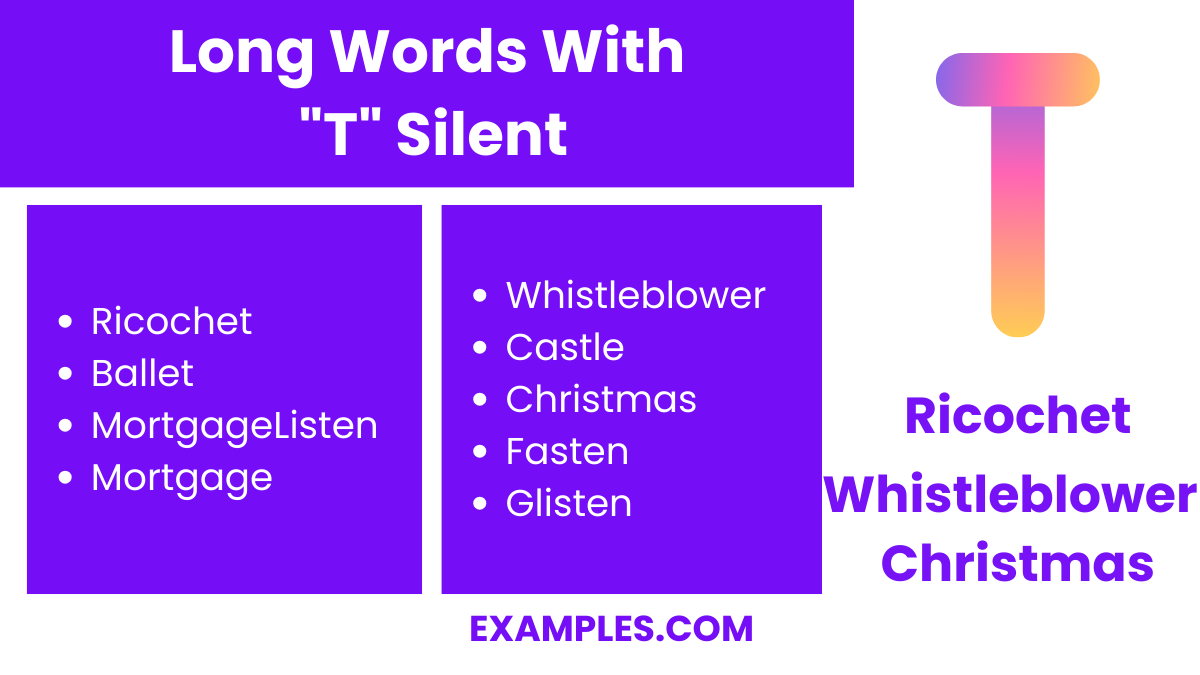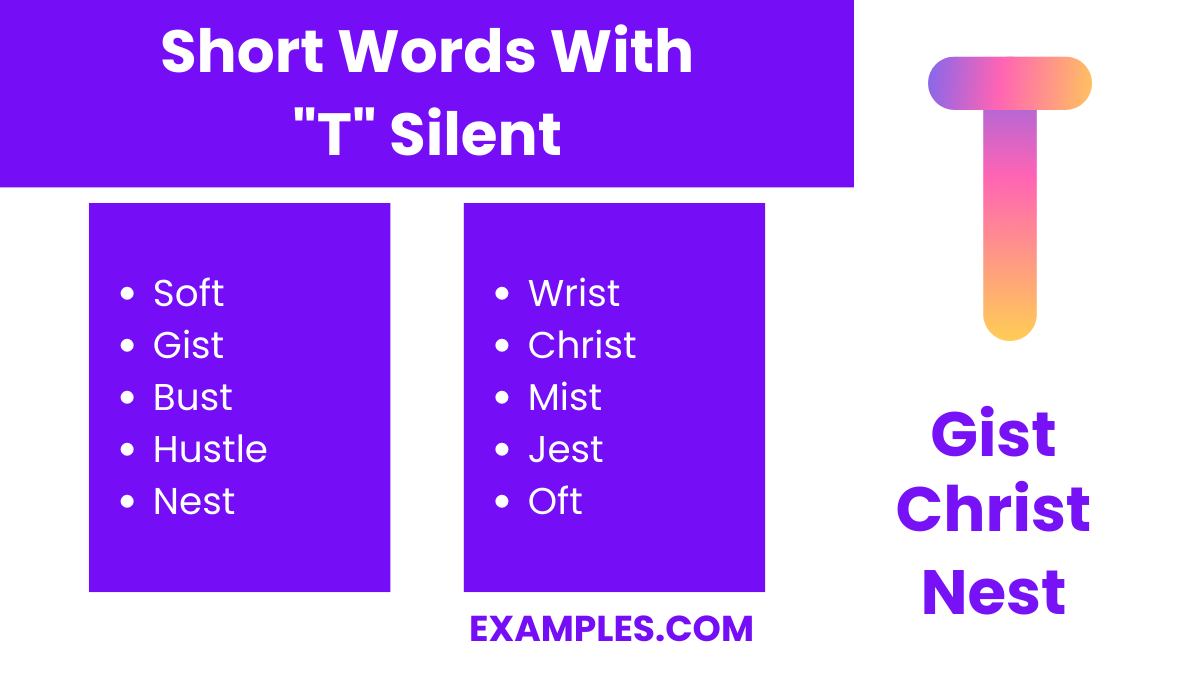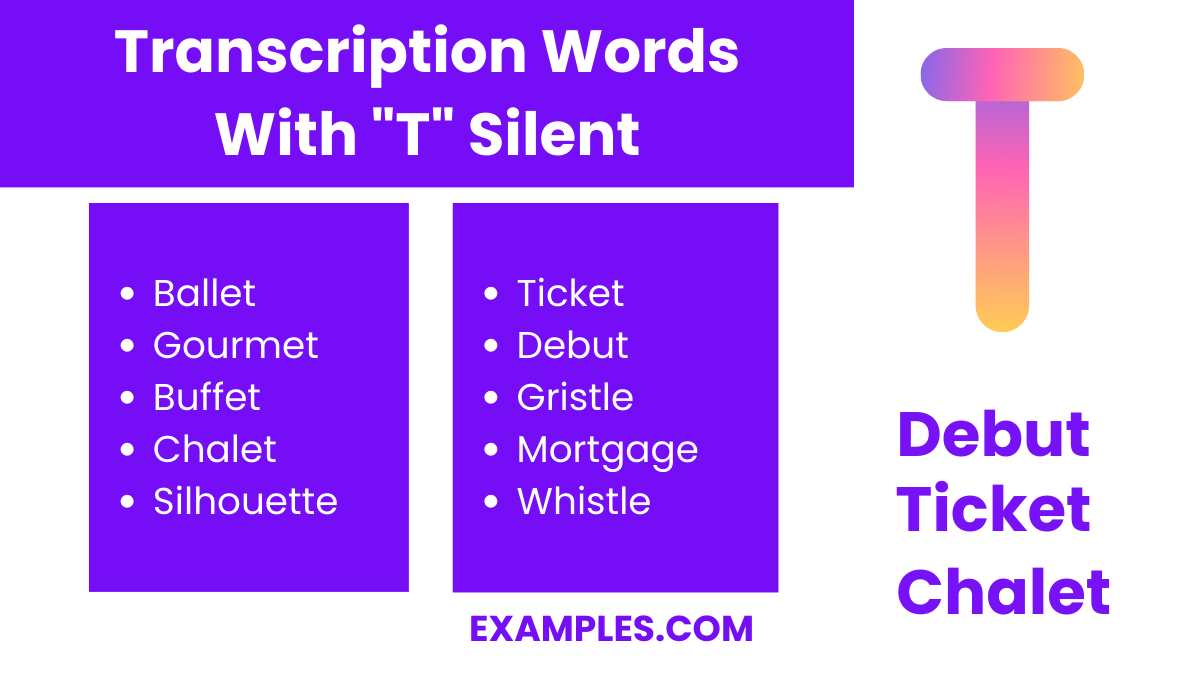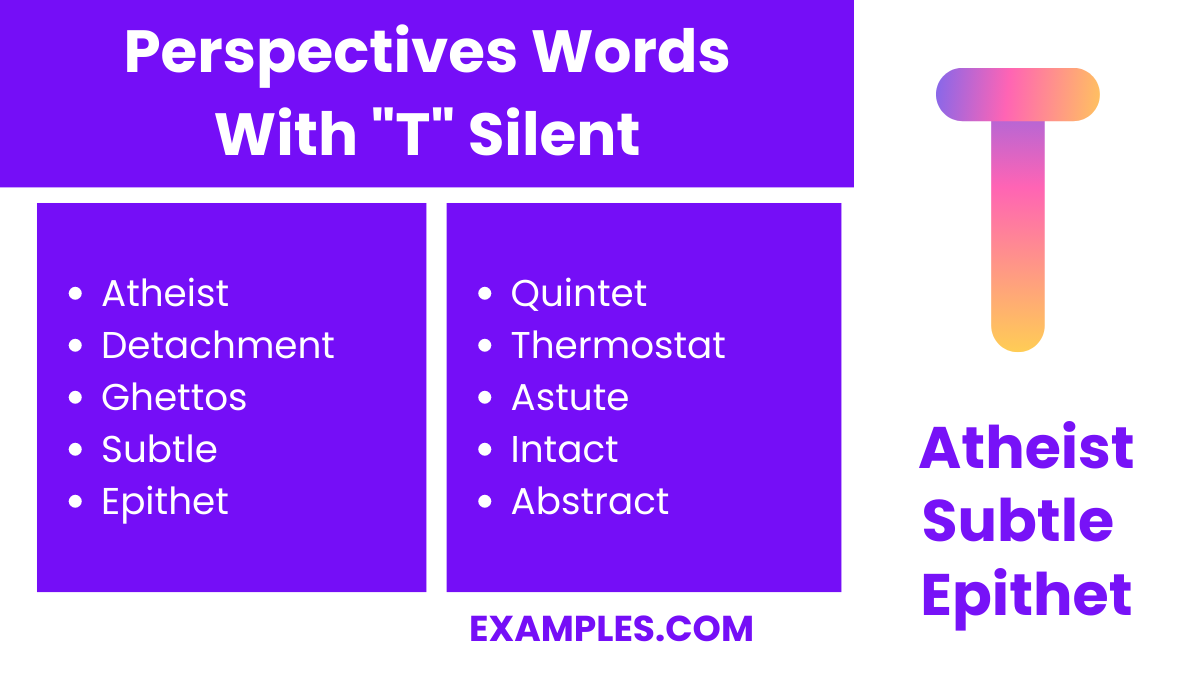450+ T Silent Words List, Meaning, PDF
The silent “T” in English words is a subtle yet fascinating feature that can mystify even seasoned language enthusiasts. This linguistic quirk not only enriches the phonetic landscape of English but also poses a delightful challenge for learners aiming to perfect their pronunciation. Our exploration into the world of silent “T” words reveals an array of terms where the “T” remains unspoken, inviting educators, students, and language lovers to deepen their understanding and appreciation of English’s nuanced soundscape.
Download Most Commonly Used T Silent Words - PDF
100+ Most Commonly used “T” Silent Words
Compiling a list of 100 commonly used Daily Use English Words with a silent “T” is a considerable challenge due to the specific nature of English phonetics. However, there are notable words where the “T” is silent, often due to linguistic absorption from other languages or phonetic evolution. Below, I’ve assembled a list that includes such words along with their phonetic pronunciations. This collection aims to showcase the intriguing diversity of English pronunciation and can serve as a valuable resource for both learners and educators in understanding and mastering these unique phonetic characteristics.
| Word | Phonetic Pronunciation |
|---|---|
| Ballet | [bæˈleɪ] |
| Buffet | [bʌˈfeɪ] or [ˈbʊfeɪ] |
| Gourmet | [ɡʊrˈmeɪ] or [ˈɡʊrmeɪ] |
| Croquet | [ˈkrəʊkeɪ] |
| Valet | [ˈvæleɪ] or [væˈleɪ] |
| Silhouette | [ˈsɪluːˌɛt] |
| Debut | [deɪˈbjuː] |
| Chalet | [ˈʃæleɪ] or [ʃæˈleɪ] |
| Beret | [ˈbereɪ] or [bəˈreɪ] |
| Gourmet | [ɡʊrˈmeɪ] or [ˈɡʊrmeɪ] |
| Mortgage | [ˈmɔːrɡɪdʒ] |
| Depot | [ˈdiːpəʊ] |
| Fillet | [ˈfɪleɪ] or [fɪˈleɪ] |
| Bouquet | [buːˈkeɪ] |
| Ricochet | [ˈrɪkəʃeɪ] |
| Sabotage | [ˈsæbəˌtɑːʒ] |
| Corps | [kɔːr] |
| Yacht | [jɒt] |
| Claret | [ˈklærɪt] |
| Sachet | [ˈsæʃeɪ] |
| Etiquette | [ˈɛtɪˌkɛt] |
| Gazette | [ɡəˈzɛt] |
| Palette | [ˈpælɪt] |
| Quartet | [kwɔːrˈtɛt] |
| Ticket | [ˈtɪkɪt] |
| Whistle | [ˈwɪsəl] |
| Listen | [ˈlɪsən] |
| Castle | [ˈkæsəl] |
| Nestle | [ˈnɛsəl] |
| Glisten | [ˈɡlɪsən] |
| Fasten | [ˈfæsən] |
| Moisten | [ˈmɔɪsən] |
| Hasten | [ˈheɪsən] |
| Often | [ˈɔːfən] or [ˈɒfən] |
| Christmas | [ˈkrɪsməs] |
| Soften | [ˈsɔːfən] or [ˈsɒfən] |
| Chestnut | [ˈtʃɛsnʌt] |
| Wrestle | [ˈrɛsəl] |
| Gristle | [ˈɡrɪsəl] |
| Bustle | [ˈbʌsəl] |
| Jostle | [ˈdʒɒsəl] |
| Trestle | [ˈtrɛsəl] |
| Apostle | [əˈpɒsəl] |
| Hustle | [ˈhʌsəl] |
| Thistle | [ˈθɪsəl] |
| Kettle | [ˈkɛtəl] |
| Nettle | [ˈnɛtəl] |
| Settle | [ˈsɛtəl] |
| Mantle | [ˈmæntəl] |
| Startle | [ˈstɑːrtəl] |
| Brittle | [ˈbrɪtəl] |
| Settle | [ˈsɛtəl] |
| Rattle | [ˈrætəl] |
| Tattle | [ˈtætəl] |
| Bristle | [ˈbrɪsəl] |
| Dismantle | [dɪsˈmæntəl] |
| Startle | [ˈstɑːrtəl] |
| Whittle | [ˈwɪtəl] |
| Title | [ˈtaɪtəl] |
| Battle | [ˈbætəl] |
| Cattle | [ˈkætəl] |
| Kettle | [ˈkɛtəl] |
| Little | [ˈlɪtəl] |
| Mettle | [ˈmɛtəl] |
| Nettle | [ˈnɛtəl] |
| Pettle | [ˈpɛtəl] |
| Rattle | [ˈrætəl] |
| Settle | [ˈsɛtəl] |
| Spittle | [ˈspɪtəl] |
| Squattle | [ˈskwɑːtəl] |
| Startle | [ˈstɑːrtəl] |
| Tittle | [ˈtɪtəl] |
| Tattle | [ˈtætəl] |
| Bottle | [ˈbɒtəl] |
| Throttle | [ˈθrɒtəl] |
| Acutely | [əˈkjuːtli] |
| Subtly | [ˈsʌtli] |
| Acutely | [əˈkjuːtli] |
| Brutally | [ˈbruːtəli] |
| Curtly | [ˈkɜːtli] |
| Doubtly | [ˈdaʊtbli] |
| Futilely | [ˈfjuːtaɪlli] |
| Gently | [ˈdʒɛntli] |
| Hastily | [ˈheɪstɪli] |
| Hostilely | [ˈhɒstaɪlli] |
| Justly | [ˈdʒʌstli] |
| Keenly | [ˈkiːnli] |
| Lastly | [ˈlɑːstli] |
| Mostly | [ˈməʊstli] |
| Nestly | [ˈnɛstli] |
| Ostensibly | [ɒˈstɛnsɪbli] |
| Partly | [ˈpɑːtli] |
| Quaintly | [ˈkweɪntli] |
| Rustly | [ˈrʌstli] |
| Softly | [ˈsɒftli] |
| Tartly | [ˈtɑːtli] |
| Utterly | [ˈʌtəli] |
| Vastly | [ˈvɑːstli] |
| Wistly | [ˈwɪstli] |
| Xenophytely | [zenˈɒfɪtli] |
| Yeastly | [ˈjiːstli] |
| Zestly | [ˈzɛstli] |
Starting Words With “T” Silent
Diving into the realm of English pronunciation, we encounter the intriguing phenomenon of words starting with a silent “T”. This linguistic feature challenges conventional pronunciation rules and offers a unique opportunity for learners to enhance their spoken English skills. Interestingly, some of these words can be rhyming words, adding an enjoyable twist to the learning process. For educators aiming to equip their students with a more nuanced understanding of English phonetics and for students striving for pronunciation excellence, mastering these words is essential. Below, we present ten words where the initial “T” remains unspoken, each accompanied by its definition and phonetic pronunciation, to aid in the linguistic development of teachers and learners alike.
- Tsunami [suˈnɑː.mi] – A long, high sea wave caused by an earthquake or other disturbance.
- Tchaikovsky [tʃaɪˈkɒf.ski] – A Russian composer known for his symphonies, ballets, and operas.
- Tsimshian [ˈʃɪm.ʃi.ən] – Pertaining to a group of Indigenous peoples in the Pacific Northwest coast of North America.
- Tsetse [ˈse.tse] – A large tropical African fly that transmits the parasites causing sleeping sickness.
- Tlaloc [ˈtɬa.lok] – An Aztec god of rain and fertility.
- Tmesis [ˈtiː.mə.sɪs] – The insertion of a word or phrase between the parts of a compound word.
- Tsar [zɑːr] – A title used to designate East and South Slavic monarchs or supreme rulers of Eastern Europe.
- Tsilhqot’in [sɪlˈhoʊ.tɪn] – Relating to a Canadian First Nations people of British Columbia.
- Tsk [tsk] – A sound made to express disapproval or pity.
- Tzatziki [zæˈziː.ki] – A Greek and Turkish sauce made from yogurt and cucumber.
Ending Words With “T” Silent
The silent “T” at the end of words in English adds a layer of sophistication and complexity to the language’s pronunciation, presenting an intriguing challenge to both native speakers and language learners. This phonetic feature is particularly noticeable in certain singular and plural words, where the silent “T” remains consistent across both forms, underscoring the importance of understanding these nuances for achieving pronunciation accuracy and linguistic fluency. For educators and students focused on mastering English pronunciation, grasping these words is essential. In this context, we offer a list of ten words with a silent “T” at the end, each accompanied by its definition and phonetic pronunciation. This selection is thoughtfully designed to enhance teaching methodologies and support students in their linguistic journey, making it easier to navigate the complexities of English pronunciation in both singular and plural contexts.
- Ballet [bæˈleɪ] – A highly technical form of dance with its own vocabulary.
- Buffet [ˈbʌ.feɪ] – A meal consisting of several dishes from which guests serve themselves.
- Gourmet [ɡɔrˈmeɪ] – A connoisseur of fine food and drink; sophisticated and high quality.
- Croquet [krəʊˈkeɪ] – A lawn game in which players hit balls through hoops.
- Valet [ˈvæl.eɪ] – A personal male servant or a hotel employee performing personal services.
- Silhouette [ˌsɪl.uˈet] – The dark shape and outline of someone or something visible against a lighter background.
- Debut [ˈdeɪ.bjuː] – A person’s first appearance or performance in a particular capacity or role.
- Chalet [ˈʃæl.eɪ] – A wooden house or cottage with overhanging eaves, typically found in the Swiss Alps.
- Gourmet [ɡɔrˈmeɪ] – A connoisseur of fine food and drink.
- Claret [ˈklær.ɪt] – A red wine from Bordeaux, or a similar wine made elsewhere.
Middle Words With “T” Silent
Words with a silent “T” in the middle can often be deceptive, hiding in plain sight and altering the expected pronunciation. This characteristic of English phonetics is a critical aspect for educators to impart and for students to grasp to ensure clear and correct communication. In the following list, we present ten words with a silent “T” nestled within, each provided with its definition and phonetic pronunciation. This selection aims to assist teachers in enriching their language instruction and students in enhancing their pronunciation skills.
- Castle [ˈkæs.əl] – A large building or group of buildings fortified against attack.
- Christmas [ˈkrɪs.məs] – The annual Christian festival celebrating the birth of Jesus Christ.
- Fasten [ˈfæs.ən] – To close or join securely.
- Listen [ˈlɪs.ən] – To give one’s attention to a sound.
- Mortgage [ˈmɔr.ɡɪdʒ] – A legal agreement by which a bank lends money in exchange for taking title of the debtor’s property.
- Often [ˈɒf.ən] – Frequently; many times.
- Soften [ˈsɒf.ən] – To make or become less hard or rigid.
- Whistle [ˈwɪs.əl] – To make a clear musical sound by forcing air through a small hole or passage.
- Glisten [ˈɡlɪs.ən] – To shine with a sparkling light.
- Apostle [əˈpɒs.əl] – Each of the twelve chief disciples of Jesus Christ.
Long Words With “T” Silent
The silent “T” in long words often acts as a hidden key to the treasure chest of English language mastery, especially when it comes to difficult words that challenge both vocabulary and pronunciation skills. For educators and students alike, delving into these words is not just about expanding their linguistic repertoire; it’s about embracing the quirks and intricacies of English pronunciation that make it so unique. Accompanied by concise definitions and phonetic pronunciations, these words are tailored to elevate the educational journey of teachers aiming to impart a deeper understanding of English phonetics and students striving for excellence in communication.
- Ricochet [ˈrɪk.ə.ʃeɪ] – The action of a projectile bouncing off a surface.
- Ballet [ˈbæl.eɪ] – A classical form of dance characterized by grace and precision of movement.
- Gourmet [ɡʊərˈmeɪ] – A connoisseur of fine food and drink; someone with a refined palate.
- Listen [ˈlɪs.ən] – To give attention to sound or action.
- Mortgage [ˈmɔː.ɡɪdʒ] – A legal agreement by which a bank or creditor lends money at interest in exchange for taking title of the debtor’s property.
- Whistleblower [ˈwɪs.əlˌbləʊ.ər] – A person who informs on a person or organization engaged in an illicit activity.
- Castle [ˈkæs.əl] – A large building, typically of the medieval period, fortified against attack.
- Christmas [ˈkrɪs.məs] – The annual Christian festival celebrating Christ’s birth, held on December 25.
- Fasten [ˈfæs.ən] – To close or secure something.
- Glisten [ˈɡlɪs.ən] – To shine with a sparkling light.
Short Words With “T” Silent
In the world of English pronunciation, short words with a silent “T” offer a unique challenge, proving that size does not dictate complexity. These words, concise yet tricky, often include funny words that add a touch of humor to the learning experience, making them essential in navigating the nuances of English phonetics. This collection presents ten short words, each with a silent “T”, providing educators and students with the opportunity to delve into the subtleties of spoken English. Complete with definitions and phonetics, these words are curated to support an engaging and informative educational experience, enhancing both teaching methodologies and learning outcomes.
- Soft [sɒf] – Easy to mold, cut, compress, or fold; not hard or firm to the touch.
- Gist [dʒɪst] – The substance or essence of a speech or text.
- Bust [bʌst] – A sculpture depicting a person’s head, shoulders, and chest.
- Hustle [ˈhʌs.əl] – To move hurriedly or unceremoniously in a specified direction.
- Nest [nɛst] – A structure or place made or chosen by a bird for laying eggs and sheltering its young.
- Wrist [rɪst] – The joint connecting the hand with the forearm.
- Christ [kraɪst] – The title, also treated as a name, given to Jesus of Nazareth.
- Mist [mɪst] – A cloud of tiny water droplets suspended in the atmosphere at or near the earth’s surface.
- Jest [dʒɛst] – A thing said or done for amusement; a joke.
- Oft [ɒft] – Frequently; many times (archaic or poetic).
Transcription Words With “T” Silent
In the intricate dance of English pronunciation, words with a silent “T” present a unique choreography, especially in transcription contexts where every sound and silence plays a pivotal role. Among these, praising words, with their silent “T”, hold a special place, offering a blend of positive reinforcement and phonetic challenge. For educators dedicated to honing their students’ phonetic transcription skills and students keen on mastering the subtleties of English pronunciation, these words offer a rich field for exploration. Accompanied by definitions and phonetic pronunciations, these words are selected to enrich the academic journey, fostering precision in transcription and a deeper appreciation for the nuances of spoken English.
- Ballet [bæˈleɪ] – A classical form of dance known for its grace and precision.
- Gourmet [ɡʊərˈmeɪ] – A connoisseur of fine food and drink, indicative of sophisticated taste.
- Buffet [bʌˈfeɪ] – A meal where guests serve themselves from a variety of dishes set out on a table or sideboard.
- Chalet [ˈʃæl.eɪ] – A type of wooden house or cottage with overhanging eaves, typically found in the Swiss Alps.
- Silhouette [ˌsɪl.uˈet] – The dark shape and outline of someone or something visible against a lighter background.
- Ticket [ˈtɪk.ɪt] – A piece of paper or small card that gives the holder a certain right, particularly to enter a place, travel by public transport, or participate in an event.
- Debut [ˈdeɪ.bjuː] – A person’s first appearance or performance in a particular capacity or role.
- Gristle [ˈɡrɪs.əl] – Tough, fibrous tissue, especially in meat.
- Mortgage [ˈmɔː.ɡɪdʒ] – A legal agreement by which a bank, building society, etc. lends money at interest in exchange for taking the title of the debtor’s property.
- Whistle [ˈwɪs.əl] – To emit a clear, high-pitched sound by forcing breath through a small hole between partly closed lips, or between one’s teeth
Perspectives Words With “T” Silent
Words containing a silent “T” that convey perspectives, ideologies, or philosophical views are especially intriguing, offering a window into various ways of thinking and seeing the world. Among these, sight words with a silent “T” are particularly noteworthy, as they frequently appear in texts and discussions, making them essential tools for intellectual exploration and expression. For teachers and students, these words are not merely vocabulary items but gateways to deeper understanding and communication. The following list includes ten words with a silent “T”, each associated with a particular perspective or concept, complete with definitions and phonetic pronunciations. These words are carefully chosen to foster critical thinking, facilitate meaningful discussions, and enhance communicative abilities in both academic settings and real-world interactions.
- Atheist [ˈeɪ.θi.ɪst] – A person who disbelieves or lacks belief in the existence of God or gods.
- Detachment [dɪˈtætʃ.mənt] – The state of being objective or aloof.
- Ghettos [ˈɡɛt.oʊz] – Parts of a city, especially slum areas, occupied by a minority group or groups.
- Subtle [ˈsʌt.əl] – So delicate or precise as to be difficult to analyze or describe.
- Epithet [ˈɛp.ɪ.θɛt] – An adjective or descriptive phrase expressing a quality characteristic of the person or thing mentioned.
- Quintet [kwɪnˈtɛt] – A group of five people playing music or singing together.
- Thermostat [ˈθɜːr.mə.stæt] – A device that automatically regulates temperature, or that activates a device when the temperature reaches a certain point.
- Astute [əˈstjuːt] – Having or showing an ability to accurately assess situations or people and turn this to one’s advantage.
- Intact [ɪnˈtækt] – Not damaged or impaired in any way; complete.
- Abstract [ˈæb.strækt] – Existing in thought or as an idea but not having a physical or concrete existence.
In conclusion, navigating through the silent “T” in words unveils the subtleties of English pronunciation, offering a unique learning curve for students and a teaching moment for educators. Mastering these words not only polishes pronunciation skills but also deepens linguistic understanding, enriching the journey of language learning and teaching with unexpected discoveries and insights into the complexities of spoken English.
450+ T Silent Words List, Meaning, PDF

The silent “T” in English words is a subtle yet fascinating feature that can mystify even seasoned language enthusiasts. This linguistic quirk not only enriches the phonetic landscape of English but also poses a delightful challenge for learners aiming to perfect their pronunciation. Our exploration into the world of silent “T” words reveals an array of terms where the “T” remains unspoken, inviting educators, students, and language lovers to deepen their understanding and appreciation of English’s nuanced soundscape.
Download Most Commonly Used T Silent Words - PDF
100+ Most Commonly used “T” Silent Words
Compiling a list of 100 commonly used Daily Use English Words with a silent “T” is a considerable challenge due to the specific nature of English phonetics. However, there are notable words where the “T” is silent, often due to linguistic absorption from other languages or phonetic evolution. Below, I’ve assembled a list that includes such words along with their phonetic pronunciations. This collection aims to showcase the intriguing diversity of English pronunciation and can serve as a valuable resource for both learners and educators in understanding and mastering these unique phonetic characteristics.
Word | Phonetic Pronunciation |
|---|---|
Ballet | [bæˈleɪ] |
Buffet | [bʌˈfeɪ] or [ˈbʊfeɪ] |
Gourmet | [ɡʊrˈmeɪ] or [ˈɡʊrmeɪ] |
Croquet | [ˈkrəʊkeɪ] |
Valet | [ˈvæleɪ] or [væˈleɪ] |
Silhouette | [ˈsɪluːˌɛt] |
Debut | [deɪˈbjuː] |
Chalet | [ˈʃæleɪ] or [ʃæˈleɪ] |
Beret | [ˈbereɪ] or [bəˈreɪ] |
Gourmet | [ɡʊrˈmeɪ] or [ˈɡʊrmeɪ] |
Mortgage | [ˈmɔːrɡɪdʒ] |
Depot | [ˈdiːpəʊ] |
Fillet | [ˈfɪleɪ] or [fɪˈleɪ] |
Bouquet | [buːˈkeɪ] |
Ricochet | [ˈrɪkəʃeɪ] |
Sabotage | [ˈsæbəˌtɑːʒ] |
Corps | [kɔːr] |
Yacht | [jɒt] |
Claret | [ˈklærɪt] |
Sachet | [ˈsæʃeɪ] |
Etiquette | [ˈɛtɪˌkɛt] |
Gazette | [ɡəˈzɛt] |
Palette | [ˈpælɪt] |
Quartet | [kwɔːrˈtɛt] |
Ticket | [ˈtɪkɪt] |
Whistle | [ˈwɪsəl] |
Listen | [ˈlɪsən] |
Castle | [ˈkæsəl] |
Nestle | [ˈnɛsəl] |
Glisten | [ˈɡlɪsən] |
Fasten | [ˈfæsən] |
Moisten | [ˈmɔɪsən] |
Hasten | [ˈheɪsən] |
Often | [ˈɔːfən] or [ˈɒfən] |
Christmas | [ˈkrɪsməs] |
Soften | [ˈsɔːfən] or [ˈsɒfən] |
Chestnut | [ˈtʃɛsnʌt] |
Wrestle | [ˈrɛsəl] |
Gristle | [ˈɡrɪsəl] |
Bustle | [ˈbʌsəl] |
Jostle | [ˈdʒɒsəl] |
Trestle | [ˈtrɛsəl] |
Apostle | [əˈpɒsəl] |
Hustle | [ˈhʌsəl] |
Thistle | [ˈθɪsəl] |
Kettle | [ˈkɛtəl] |
Nettle | [ˈnɛtəl] |
Settle | [ˈsɛtəl] |
Mantle | [ˈmæntəl] |
Startle | [ˈstɑːrtəl] |
Brittle | [ˈbrɪtəl] |
Settle | [ˈsɛtəl] |
Rattle | [ˈrætəl] |
Tattle | [ˈtætəl] |
Bristle | [ˈbrɪsəl] |
Dismantle | [dɪsˈmæntəl] |
Startle | [ˈstɑːrtəl] |
Whittle | [ˈwɪtəl] |
Title | [ˈtaɪtəl] |
Battle | [ˈbætəl] |
Cattle | [ˈkætəl] |
Kettle | [ˈkɛtəl] |
Little | [ˈlɪtəl] |
Mettle | [ˈmɛtəl] |
Nettle | [ˈnɛtəl] |
Pettle | [ˈpɛtəl] |
Rattle | [ˈrætəl] |
Settle | [ˈsɛtəl] |
Spittle | [ˈspɪtəl] |
Squattle | [ˈskwɑːtəl] |
Startle | [ˈstɑːrtəl] |
Tittle | [ˈtɪtəl] |
Tattle | [ˈtætəl] |
Bottle | [ˈbɒtəl] |
Throttle | [ˈθrɒtəl] |
Acutely | [əˈkjuːtli] |
Subtly | [ˈsʌtli] |
Acutely | [əˈkjuːtli] |
Brutally | [ˈbruːtəli] |
Curtly | [ˈkɜːtli] |
Doubtly | [ˈdaʊtbli] |
Futilely | [ˈfjuːtaɪlli] |
Gently | [ˈdʒɛntli] |
Hastily | [ˈheɪstɪli] |
Hostilely | [ˈhɒstaɪlli] |
Justly | [ˈdʒʌstli] |
Keenly | [ˈkiːnli] |
Lastly | [ˈlɑːstli] |
Mostly | [ˈməʊstli] |
Nestly | [ˈnɛstli] |
Ostensibly | [ɒˈstɛnsɪbli] |
Partly | [ˈpɑːtli] |
Quaintly | [ˈkweɪntli] |
Rustly | [ˈrʌstli] |
Softly | [ˈsɒftli] |
Tartly | [ˈtɑːtli] |
Utterly | [ˈʌtəli] |
Vastly | [ˈvɑːstli] |
Wistly | [ˈwɪstli] |
Xenophytely | [zenˈɒfɪtli] |
Yeastly | [ˈjiːstli] |
Zestly | [ˈzɛstli] |
Starting Words With “T” Silent
Diving into the realm of English pronunciation, we encounter the intriguing phenomenon of words starting with a silent “T”. This linguistic feature challenges conventional pronunciation rules and offers a unique opportunity for learners to enhance their spoken English skills. Interestingly, some of these words can be rhyming words, adding an enjoyable twist to the learning process. For educators aiming to equip their students with a more nuanced understanding of English phonetics and for students striving for pronunciation excellence, mastering these words is essential. Below, we present ten words where the initial “T” remains unspoken, each accompanied by its definition and phonetic pronunciation, to aid in the linguistic development of teachers and learners alike.
Tsunami [suˈnɑː.mi] – A long, high sea wave caused by an earthquake or other disturbance.
Tchaikovsky [tʃaɪˈkɒf.ski] – A Russian composer known for his symphonies, ballets, and operas.
Tsimshian [ˈʃɪm.ʃi.ən] – Pertaining to a group of Indigenous peoples in the Pacific Northwest coast of North America.
Tsetse [ˈse.tse] – A large tropical African fly that transmits the parasites causing sleeping sickness.
Tlaloc [ˈtɬa.lok] – An Aztec god of rain and fertility.
Tmesis [ˈtiː.mə.sɪs] – The insertion of a word or phrase between the parts of a compound word.
Tsar [zɑːr] – A title used to designate East and South Slavic monarchs or supreme rulers of Eastern Europe.
Tsilhqot’in [sɪlˈhoʊ.tɪn] – Relating to a Canadian First Nations people of British Columbia.
Tsk [tsk] – A sound made to express disapproval or pity.
Tzatziki [zæˈziː.ki] – A Greek and Turkish sauce made from yogurt and cucumber.
Ending Words With “T” Silent
The silent “T” at the end of words in English adds a layer of sophistication and complexity to the language’s pronunciation, presenting an intriguing challenge to both native speakers and language learners. This phonetic feature is particularly noticeable in certain singular and plural words, where the silent “T” remains consistent across both forms, underscoring the importance of understanding these nuances for achieving pronunciation accuracy and linguistic fluency. For educators and students focused on mastering English pronunciation, grasping these words is essential. In this context, we offer a list of ten words with a silent “T” at the end, each accompanied by its definition and phonetic pronunciation. This selection is thoughtfully designed to enhance teaching methodologies and support students in their linguistic journey, making it easier to navigate the complexities of English pronunciation in both singular and plural contexts.
Ballet [bæˈleɪ] – A highly technical form of dance with its own vocabulary.
Buffet [ˈbʌ.feɪ] – A meal consisting of several dishes from which guests serve themselves.
Gourmet [ɡɔrˈmeɪ] – A connoisseur of fine food and drink; sophisticated and high quality.
Croquet [krəʊˈkeɪ] – A lawn game in which players hit balls through hoops.
Valet [ˈvæl.eɪ] – A personal male servant or a hotel employee performing personal services.
Silhouette [ˌsɪl.uˈet] – The dark shape and outline of someone or something visible against a lighter background.
Debut [ˈdeɪ.bjuː] – A person’s first appearance or performance in a particular capacity or role.
Chalet [ˈʃæl.eɪ] – A wooden house or cottage with overhanging eaves, typically found in the Swiss Alps.
Gourmet [ɡɔrˈmeɪ] – A connoisseur of fine food and drink.
Claret [ˈklær.ɪt] – A red wine from Bordeaux, or a similar wine made elsewhere.
Middle Words With “T” Silent
Words with a silent “T” in the middle can often be deceptive, hiding in plain sight and altering the expected pronunciation. This characteristic of English phonetics is a critical aspect for educators to impart and for students to grasp to ensure clear and correct communication. In the following list, we present ten words with a silent “T” nestled within, each provided with its definition and phonetic pronunciation. This selection aims to assist teachers in enriching their language instruction and students in enhancing their pronunciation skills.
Castle [ˈkæs.əl] – A large building or group of buildings fortified against attack.
Christmas [ˈkrɪs.məs] – The annual Christian festival celebrating the birth of Jesus Christ.
Fasten [ˈfæs.ən] – To close or join securely.
Listen [ˈlɪs.ən] – To give one’s attention to a sound.
Mortgage [ˈmɔr.ɡɪdʒ] – A legal agreement by which a bank lends money in exchange for taking title of the debtor’s property.
Often [ˈɒf.ən] – Frequently; many times.
Soften [ˈsɒf.ən] – To make or become less hard or rigid.
Whistle [ˈwɪs.əl] – To make a clear musical sound by forcing air through a small hole or passage.
Glisten [ˈɡlɪs.ən] – To shine with a sparkling light.
Apostle [əˈpɒs.əl] – Each of the twelve chief disciples of Jesus Christ.
Long Words With “T” Silent
The silent “T” in long words often acts as a hidden key to the treasure chest of English language mastery, especially when it comes to difficult words that challenge both vocabulary and pronunciation skills. For educators and students alike, delving into these words is not just about expanding their linguistic repertoire; it’s about embracing the quirks and intricacies of English pronunciation that make it so unique. Accompanied by concise definitions and phonetic pronunciations, these words are tailored to elevate the educational journey of teachers aiming to impart a deeper understanding of English phonetics and students striving for excellence in communication.
Ricochet [ˈrɪk.ə.ʃeɪ] – The action of a projectile bouncing off a surface.
Ballet [ˈbæl.eɪ] – A classical form of dance characterized by grace and precision of movement.
Gourmet [ɡʊərˈmeɪ] – A connoisseur of fine food and drink; someone with a refined palate.
Listen [ˈlɪs.ən] – To give attention to sound or action.
Mortgage [ˈmɔː.ɡɪdʒ] – A legal agreement by which a bank or creditor lends money at interest in exchange for taking title of the debtor’s property.
Whistleblower [ˈwɪs.əlˌbləʊ.ər] – A person who informs on a person or organization engaged in an illicit activity.
Castle [ˈkæs.əl] – A large building, typically of the medieval period, fortified against attack.
Christmas [ˈkrɪs.məs] – The annual Christian festival celebrating Christ’s birth, held on December 25.
Fasten [ˈfæs.ən] – To close or secure something.
Glisten [ˈɡlɪs.ən] – To shine with a sparkling light.
Short Words With “T” Silent
In the world of English pronunciation, short words with a silent “T” offer a unique challenge, proving that size does not dictate complexity. These words, concise yet tricky, often include funny words that add a touch of humor to the learning experience, making them essential in navigating the nuances of English phonetics. This collection presents ten short words, each with a silent “T”, providing educators and students with the opportunity to delve into the subtleties of spoken English. Complete with definitions and phonetics, these words are curated to support an engaging and informative educational experience, enhancing both teaching methodologies and learning outcomes.
Soft [sɒf] – Easy to mold, cut, compress, or fold; not hard or firm to the touch.
Gist [dʒɪst] – The substance or essence of a speech or text.
Bust [bʌst] – A sculpture depicting a person’s head, shoulders, and chest.
Hustle [ˈhʌs.əl] – To move hurriedly or unceremoniously in a specified direction.
Nest [nɛst] – A structure or place made or chosen by a bird for laying eggs and sheltering its young.
Wrist [rɪst] – The joint connecting the hand with the forearm.
Christ [kraɪst] – The title, also treated as a name, given to Jesus of Nazareth.
Mist [mɪst] – A cloud of tiny water droplets suspended in the atmosphere at or near the earth’s surface.
Jest [dʒɛst] – A thing said or done for amusement; a joke.
Oft [ɒft] – Frequently; many times (archaic or poetic).
Transcription Words With “T” Silent
In the intricate dance of English pronunciation, words with a silent “T” present a unique choreography, especially in transcription contexts where every sound and silence plays a pivotal role. Among these, praising words, with their silent “T”, hold a special place, offering a blend of positive reinforcement and phonetic challenge. For educators dedicated to honing their students’ phonetic transcription skills and students keen on mastering the subtleties of English pronunciation, these words offer a rich field for exploration. Accompanied by definitions and phonetic pronunciations, these words are selected to enrich the academic journey, fostering precision in transcription and a deeper appreciation for the nuances of spoken English.
Ballet [bæˈleɪ] – A classical form of dance known for its grace and precision.
Gourmet [ɡʊərˈmeɪ] – A connoisseur of fine food and drink, indicative of sophisticated taste.
Buffet [bʌˈfeɪ] – A meal where guests serve themselves from a variety of dishes set out on a table or sideboard.
Chalet [ˈʃæl.eɪ] – A type of wooden house or cottage with overhanging eaves, typically found in the Swiss Alps.
Silhouette [ˌsɪl.uˈet] – The dark shape and outline of someone or something visible against a lighter background.
Ticket [ˈtɪk.ɪt] – A piece of paper or small card that gives the holder a certain right, particularly to enter a place, travel by public transport, or participate in an event.
Debut [ˈdeɪ.bjuː] – A person’s first appearance or performance in a particular capacity or role.
Gristle [ˈɡrɪs.əl] – Tough, fibrous tissue, especially in meat.
Mortgage [ˈmɔː.ɡɪdʒ] – A legal agreement by which a bank, building society, etc. lends money at interest in exchange for taking the title of the debtor’s property.
Whistle [ˈwɪs.əl] – To emit a clear, high-pitched sound by forcing breath through a small hole between partly closed lips, or between one’s teeth
Perspectives Words With “T” Silent
Words containing a silent “T” that convey perspectives, ideologies, or philosophical views are especially intriguing, offering a window into various ways of thinking and seeing the world. Among these, sight words with a silent “T” are particularly noteworthy, as they frequently appear in texts and discussions, making them essential tools for intellectual exploration and expression. For teachers and students, these words are not merely vocabulary items but gateways to deeper understanding and communication. The following list includes ten words with a silent “T”, each associated with a particular perspective or concept, complete with definitions and phonetic pronunciations. These words are carefully chosen to foster critical thinking, facilitate meaningful discussions, and enhance communicative abilities in both academic settings and real-world interactions.
Atheist [ˈeɪ.θi.ɪst] – A person who disbelieves or lacks belief in the existence of God or gods.
Detachment [dɪˈtætʃ.mənt] – The state of being objective or aloof.
Ghettos [ˈɡɛt.oʊz] – Parts of a city, especially slum areas, occupied by a minority group or groups.
Subtle [ˈsʌt.əl] – So delicate or precise as to be difficult to analyze or describe.
Epithet [ˈɛp.ɪ.θɛt] – An adjective or descriptive phrase expressing a quality characteristic of the person or thing mentioned.
Quintet [kwɪnˈtɛt] – A group of five people playing music or singing together.
Thermostat [ˈθɜːr.mə.stæt] – A device that automatically regulates temperature, or that activates a device when the temperature reaches a certain point.
Astute [əˈstjuːt] – Having or showing an ability to accurately assess situations or people and turn this to one’s advantage.
Intact [ɪnˈtækt] – Not damaged or impaired in any way; complete.
Abstract [ˈæb.strækt] – Existing in thought or as an idea but not having a physical or concrete existence.
In conclusion, navigating through the silent “T” in words unveils the subtleties of English pronunciation, offering a unique learning curve for students and a teaching moment for educators. Mastering these words not only polishes pronunciation skills but also deepens linguistic understanding, enriching the journey of language learning and teaching with unexpected discoveries and insights into the complexities of spoken English.


